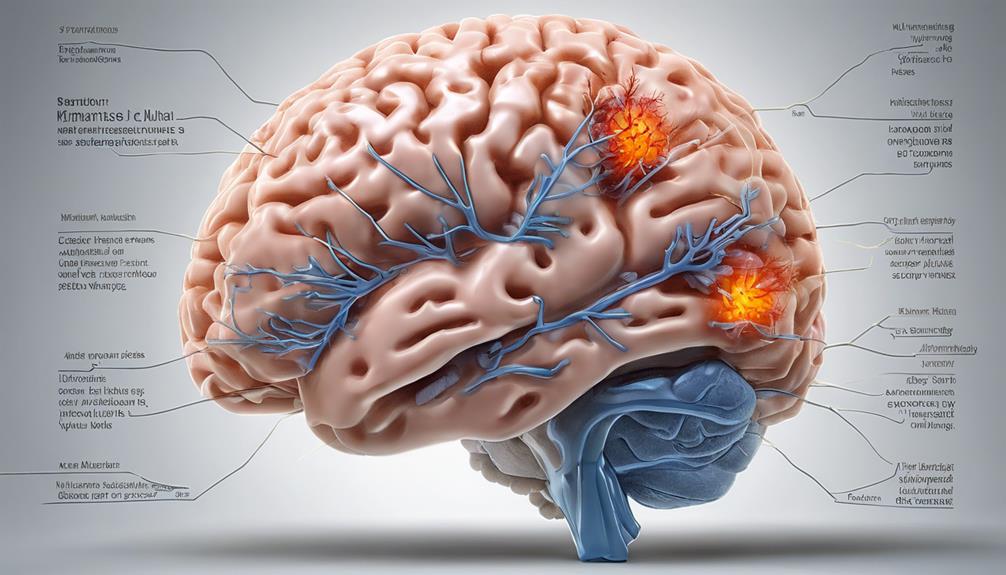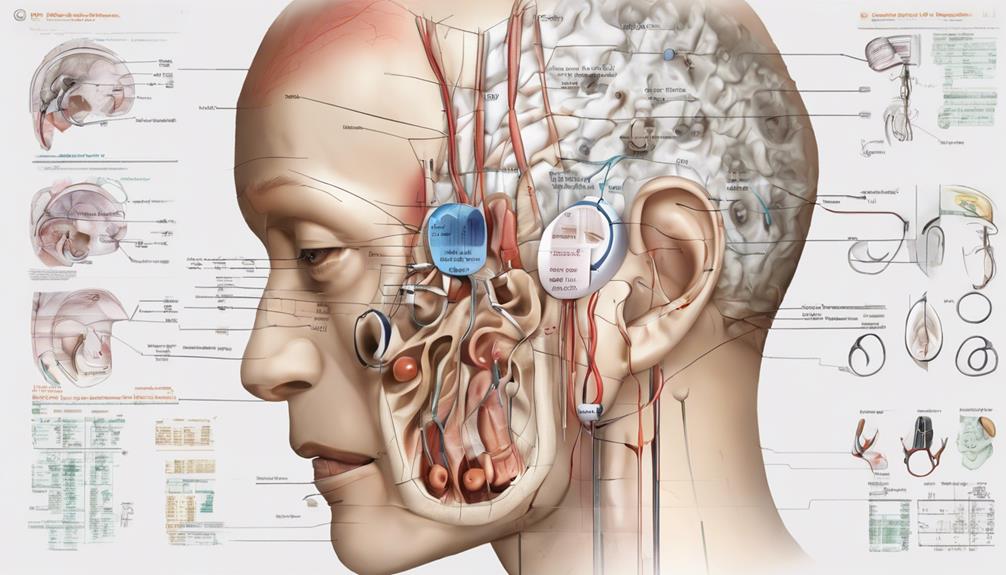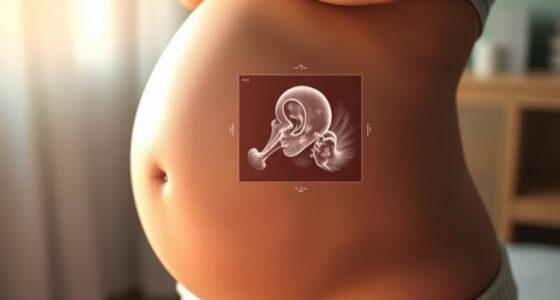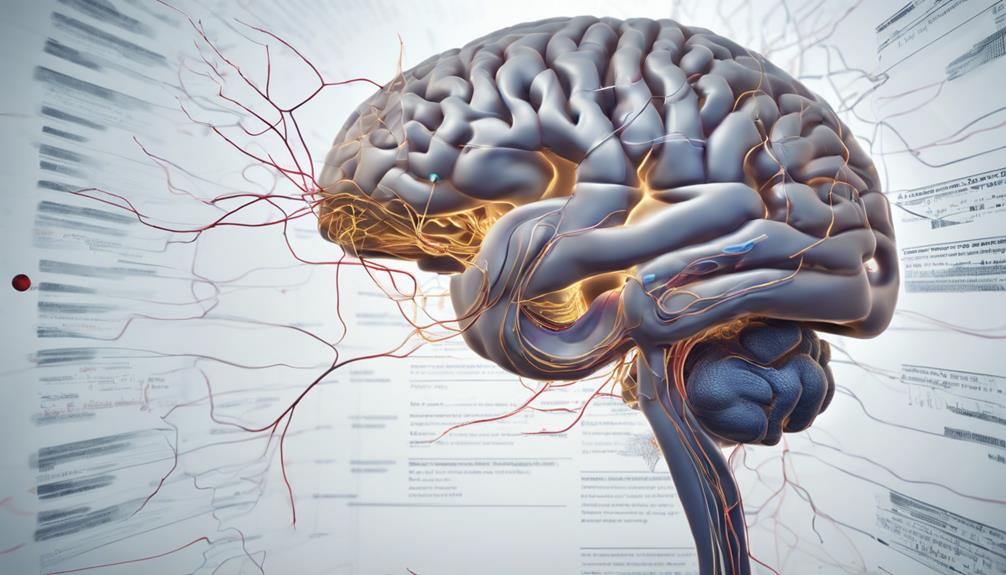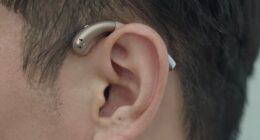Imagine a world where sounds slowly fade away, where whispers and happy laughter become distant echoes. Meningitis, a disease often linked to silence, can greatly impact a person’s ability to hear.
Understanding the intricacies of how this disease can lead to hearing loss is vital for early detection and intervention. As we navigate through the complexities of this topic, we unravel the connection between meningitis and its repercussions on our auditory senses.
Together, let's explore the intricate web that links these two seemingly distinct aspects of health and well-being.
Key Takeaways
- Bacterial meningitis poses a higher risk of permanent sensorineural deafness compared to viral meningitis.
- Cochlear damage and nerve inflammation contribute to varying degrees of hearing loss severity.
- Timely hearing tests for children post-bacterial meningitis are crucial for early detection and management.
- Hearing aids, cochlear implants, and therapy aid in managing meningitis-induced hearing deficits effectively.
Types of Hearing Loss From Meningitis
Sensorineural deafness resulting from bacterial meningitis commonly occurs due to inner ear or auditory nerve damage. When bacterial meningitis infects the central nervous system, it can also impact the delicate structures responsible for hearing.
Cochlear inflammation and damage to the auditory nerve are key factors in the development of sensorineural hearing loss post-meningitis. The severity of hearing loss can vary from mild to profound, affecting one or both ears. Unlike bacterial meningitis, viral meningitis is less likely to result in permanent sensorineural deafness.
Children with bacterial meningitis are particularly at risk for hearing loss and should undergo timely hearing tests to assess any potential damage. These tests are crucial as sensorineural deafness can manifest early in the course of the illness.
Understanding the types of hearing loss associated with meningitis is essential for prompt diagnosis and intervention in affected individuals.
Impact of Meningitis on Hearing

Bacterial meningitis presents a significant risk to hearing function, particularly through the potential development of permanent sensorineural deafness. This type of hearing loss can result from damage to the cochlea or inflammation of the auditory nerve caused by the infection. Deafness post-meningitis can vary in severity, affecting one or both ears. Cochlear damage plays a crucial role in the development of sensorineural hearing loss, especially in cases of Streptococcus pneumoniae meningitis, where recovery of cochlear function is limited.
| Impact of Meningitis on Hearing | |
|---|---|
| Affected Area | Consequences |
| Inner Ear | Cochlear damage |
| Auditory Nerve | Inflammation |
| Cochlea | Permanent deafness |
Bacterial meningitis, as opposed to viral meningitis, is more commonly associated with deafness following an infection. Children recovering from bacterial meningitis should undergo a hearing test within four weeks post-illness to monitor potential hearing impairments, as deafness can manifest early and stabilize within a few months.
Risk Factors for Hearing Impairment
Our understanding of the risk factors for hearing impairment post-meningitis continues to evolve through research and clinical observations. Young age, severity of symptoms, delayed treatment, and specific cerebrospinal fluid substances play crucial roles in the development of hearing loss. Bacterial meningitis, especially when caused by Streptococcus pneumoniae and Neisseria meningitidis, is strongly linked to hearing impairment.
In high-income countries, pneumococcal meningitis leads to hearing loss in 14-32% of cases, while around 4% of children with meningococcal meningitis experience hearing impairment. Although viral meningitis rarely results in hearing loss, fungal and parasitic meningitis have lower probabilities of causing hearing impairment.
Both infections and non-infectious factors such as brain surgery can trigger meningitis, with bacterial strains being more commonly associated with hearing loss compared to other types. Understanding these risk factors is vital in identifying individuals at higher risk for hearing impairment post-meningitis.
Diagnostic Tests for Meningitis-Related Hearing Loss

When evaluating individuals for meningitis-related hearing loss, diagnostic tests such as otoscopy and behavioral assessments are commonly employed to assess auditory function. Audiologists may utilize various behavioral tests like Behavioral Observation Audiometry (BOA), Visual Reinforcement Audiometry (VRA), and Conditioned Play Audiometry (CPA) to evaluate hearing in patients post-bacterial meningitis. Additionally, conventional audiometry, including pure-tone testing and bone conduction testing, can provide valuable information on hearing sensitivity in individuals recovering from meningitis. Imaging tests such as MRI or CT scans may be necessary if cochlear ossification is suspected in cases of meningitis-induced hearing loss. Post-infection hearing tests are crucial for monitoring and managing hearing impairment in infants, children, teens, and adults who have experienced meningitis. Regular follow-up testing is essential to track changes in hearing post-meningitis and assess the effectiveness of management strategies for hearing loss.
| Diagnostic Tests | Description | Utility |
|---|---|---|
| Otoscopy | Examines ear canal for fluid or abnormalities | Identifies potential causes of hearing loss |
| Behavioral Assessments | BOA, VRA, CPA are used to evaluate hearing in non-verbal or pediatric patients | Assesses hearing abilities in special populations |
| Audiometry | Includes pure-tone and bone conduction testing to measure hearing sensitivity post-bacterial meningitis | Quantifies level of hearing loss |
Treatment Options for Meningitis-Induced Hearing Deficits
Treatment options for meningitis-induced hearing deficits commonly include the use of hearing aids, cochlear implants, speech therapy, auditory-verbal therapy, and vaccination against specific pathogens known to cause meningitis.
- Hearing Aids: In-the-ear or behind-the-ear devices are often utilized to manage hearing deficits resulting from bacterial meningitis.
- Cochlear Implants: Severe cases of sensorineural hearing loss may require cochlear implants for improved auditory function.
- Speech Therapy and Auditory-Verbal Therapy: These supportive options play a crucial role in managing hearing loss post-meningitis.
- Vaccination: Hib, pneumococcal, Meningococcal conjugate, and MenB vaccines are essential in preventing meningitis-induced hearing deficits.
Timely implementation of treatment options like hearing aids and cochlear implants can significantly enhance the quality of life for individuals dealing with hearing loss post-meningitis. By incorporating a comprehensive approach that includes therapy and the latest medical advancements, individuals can experience improved communication abilities and overall well-being despite the challenges posed by meningitis-related hearing deficits.
Frequently Asked Questions
What Is the Most Common Cause of Hearing Loss?
The most common cause of hearing loss can be attributed to bacterial meningitis, particularly infections from Streptococcus pneumoniae and Neisseria meningitidis. In high-income countries, a notable percentage of pneumococcal and meningococcal meningitis cases in children result in hearing impairment.
It's crucial to be aware of these risks and the factors contributing to hearing loss post-meningitis, such as age, symptoms severity, treatment timing, and cerebrospinal fluid composition. Early detection and monitoring are vital for effective management.
What Is the Pathophysiology of Hearing Loss?
When sound waves enter the ear, they travel through the ear canal and cause vibrations in the eardrum. These vibrations are then transmitted to the cochlea, a spiral-shaped structure in the inner ear.
Within the cochlea, hair cells convert these vibrations into electrical signals that are sent to the brain via the auditory nerve. Damage to any part of this complex system can lead to hearing loss.
Why Does Meniere's Cause Low Frequency Hearing Loss?
We experience low frequency hearing loss with Meniere's disease due to fluid buildup in the cochlea, which pressures the hair cells detecting low sounds. This condition leads to characteristic symptoms like vertigo and tinnitus.
Fluctuations in hearing, especially with low frequency sounds, are common. Treatment focuses on symptom management through lifestyle changes, medications, and surgeries in severe cases. Meniere's disease distinctly affects our ability to hear low frequency sounds.
What Are the Symptoms of Meningitis in the Ear?
We experience symptoms in the ear due to meningitis, such as sensorineural deafness, balance issues, and tinnitus. These symptoms can vary in severity and affect one or both ears.
Infections in the inner ear can cause dizziness, imbalance, and difficulty with balance tasks. Damage to the cochlea or inflammation of the auditory nerve post-meningitis can result in hearing problems.
Children, especially those with bacterial meningitis, should undergo hearing tests for symptoms like tinnitus and balance disturbances.
Conclusion
In conclusion, understanding the potential causes of hearing loss from meningitis is crucial for early detection and intervention.
The impact of this inflammatory condition on the auditory system can be significant, especially in cases of bacterial meningitis.
By recognizing the risk factors and undergoing appropriate diagnostic tests, individuals can address any hearing impairments effectively.
Stay informed, stay vigilant, and prioritize your hearing health to ensure a better quality of life.

